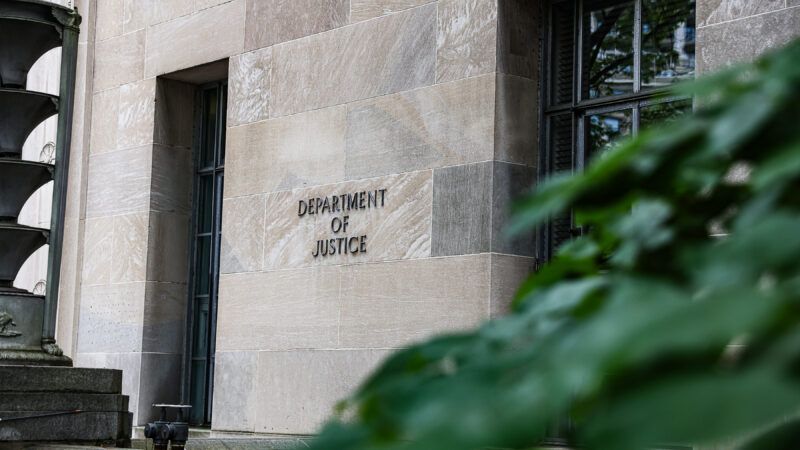Jet Blue and American Airlines Guilty in Antitrust Suit, Despite No Clear Harm to Consumers
The First Circuit's ruling is another blow to the consumer welfare standard.

American Airlines and Jet Blue violated the Sherman Antitrust Act of 1890, a federal appeals court said, by sharing revenue and coordinating service for Boston Logan, JFK, LaGuardia, and Newark Liberty airports. In his opinion, Appellate Judge William Kayatta Jr. wrote that proof of "anticompetitive harm matters not at all in this case," apparently giving no consideration to whether anyone was actually hurt by the airlines' actions.
The First Circuit Court of Appeals upheld Massachusetts District Judge Leo Sorokin's decision in U.S. v. American Airlines on Friday. The case revolved around a September 2021 complaint from the Department of Justice (DOJ) against the Northeast Alliance (NEA) between American Airlines and Jet Blue. The complaint alleged that the NEA, which took effect in February 2021, violated Section 1 of the Sherman Act by "effectively merging their operations in Boston and New York City and eliminating competition."
Though interpretations of the Sherman Act are contentious, consideration of consumers in an antitrust case should not be. Under President Joe Biden's antitrust regime, undue consideration has been paid to competition per se instead of whether coordination between firms actually hurts consumers.
Harm to consumers is still the complaint's stated motivation: The DOJ sued American Airlines and Jet Blue "to prevent hundreds of millions of dollars in harm to consumers that will occur if these two rivals are permitted to maintain this modern-day version of a nineteenth-century business trust," per its complaint.
American Airlines and Jet Blue filed a motion to dismiss in November 2021, claiming the DOJ failed to plead market power, which "requires a showing that Defendants can raise price by restricting output." Sorokin denied this motion, affirming that "no deep and searching analysis is required in order to discern" the unlawfulness of the NEA in his May 2023 ruling.
The defendants emphasize that, despite its yearlong investigation before filing its complaint, the DOJ neither found nor alleged that the NEA had increased prices or diminished the airlines' quality of service. Nonetheless, Sorokin faulted the defendants for reducing the number of competitors, undermining Jet Blue as a "maverick competitor," and engaging in horizontal market division. Yet, this market division did not meaningfully harm consumers: Jet Blue's consumer satisfaction has hovered around its pre-NEA score of 78 since its implementation and American Airlines' has increased monotonically since its implementation.
Economist and lawyer Don Boudreaux says nobody knows what the optimal industry structure is in advance; the market is fundamentally a discovery process. Nonetheless, Sorokin is convinced that more firms and competition is necessarily better. But this isn't the case. Boudreaux explains that, due to high fixed costs in the airline industry, there's even an economic argument in support of price-fixing (which is forbidden by the NEA) insofar as it encourages new firms to enter the market by reducing uncertainty about the profitability of the investment.
The DOJ should appreciate that horizontal market division is not necessarily bad for consumers. The agency itself informally colludes with the Federal Trade Commission (FTC) to specialize in enforcing the Sherman Act, while the FTC enforces the Clayton Antitrust Act.
The 1st Circuit's decision affirmed that "the Sherman Act 'exist[s] to protect the competitive process itself'" and needn't prove that prices were set above a competitive level. In so doing, Kayatta misses the forest for the trees: Consumer welfare is intrinsically important; competition is merely instrumental to that end.


Show Comments (14)